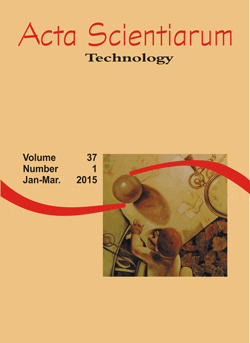<b>Study of machinability of VP 100 steel with different levels of titanium in end milling operations
DOI:
https://doi.org/10.4025/actascitechnol.v37i1.20569Keywords:
machinability, steels for plastic injection mould, volume of material removed, flank wear, VP 100 steelAbstract
During the manufacture of a mould, machining is certainly the most important process. The composition required to provide important properties in the steels used, such as hardness, wear and corrosion resistance, results in a low machinability has resulted in a low volume of material removed by the end of life of the cutting tool, due to the strong wear generate. In this study, we investigated the behavior of steel processing VP 100 is used in manufacturing plastic injection molds. To this end, we used two versions of VP100, one with 270 and another with 350 parts per million (ppm) of titanium. The tests comprise six different cutting conditions in end milling operations. We observed the volume of material removed for each tested condition, considering the evolution of flank wear of tools to a maximum of0.5 mm. Steel VP 100 with 350 ppm of Ti showed a higher volume of material removed in five of six tests showing that, in this case, a higher content of titanium improved the machinability of the steel under study.
Â
Downloads
Downloads
Published
How to Cite
Issue
Section
License
DECLARATION OF ORIGINALITY AND COPYRIGHTS
I Declare that current article is original and has not been submitted for publication, in part or in whole, to any other national or international journal.
The copyrights belong exclusively to the authors. Published content is licensed under Creative Commons Attribution 4.0 (CC BY 4.0) guidelines, which allows sharing (copy and distribution of the material in any medium or format) and adaptation (remix, transform, and build upon the material) for any purpose, even commercially, under the terms of attribution.
Read this link for further information on how to use CC BY 4.0 properly.



















8.png)




